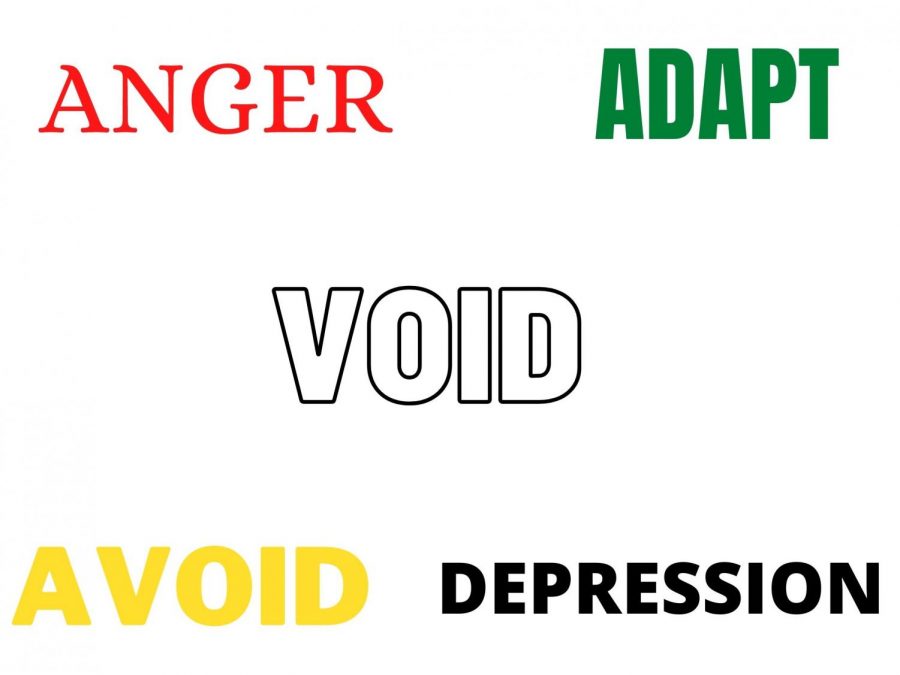The Real 5 stages of grief
At a certain point in life, it must end. Those we leave behind will grieve, mourn and eventually adapt to a new way of life. However, people should not feel pressure from society to only feel the emotions listed in the five stages of grief . “Put simply, grief is the price we pay for love, and a natural consequence of forming emotional bonds to people, projects and possessions. All that we value we will someday lose,” CEO of Australian Health Centre for Grief and Bereavement, Chris Hall MAPS, said.
August 25, 2021
Overview
When experiencing grief, one may experience: denial, anger, bargaining, depression and acceptance. While people may experience those emotions, those emotions do not define the grieving process. Grief varies from person to person and the severity changes depending on the circumstances. Anger, void, depression, avoidance and adaptation seem more appropriate to describe the grieving process of someone who suffered the loss of a parent.
Intense sadness serves as a common misconception for grief. Through movies and TV, society sees a different version of mourning that countless amounts of people feel. The media shows only one side and puts a timeline on how long people should feel these extreme emotions. Also, the five stages do not actually come in stages sometimes. Two, three or all emotions can all strike at once and continue over time.
The original five stages also compiles both mourning and grief, but only labels it as grief. The emotions on that list can fit under the normal and complicated grief category. Mourning refers to the external emotions that others see on display, while grief involves the internal emotions only felt by those experiencing them. Knowing the difference changes the impact of these emotions and actions.
Anger
Following the loss of a parent, a certain degree of anger may follow. From mild irritation to wrath, anger can immediately affect those feeling a loss. This emotion might linger over time. Certain words, smells, places and sounds can trigger someone mourning a loss. In comparison to the original five stages, anger remains one of the only emotions universal among the majority of people.
Void
When discussing the loss of a loved one, especially a parent, a physical, emotional, and metaphorical void can form. The place that a loved one once held, now empty, can allow negative feelings and thoughts to fill it. The void people experience and how they choose to fill it can lead down several different paths. Everyone copes differently, socially acceptable or not, self-medicating happens frequently. This feeling goes unnoticed and ignored. Allowing the void to grow and filling it improperly can lead to mental illness and other problems.
Depression
In comparison to the original list, depression can still apply to the grieving process. This can last for a long or short period of time and it may not come immediately after the loss. Depression, a mental illness, impacts people differently. The mildness or severity of the illness makes it unpredictable when it may strike. Depression may also trigger other mental illnesses such as anxiety and mood swings.
Avoidance
Avoidance falls under the mourning category and not the grieving category. While it involves external actions, avoidance tends to accompany the other emotions in the updated stages of grief. Previous interests and hobbies may not grasp the attention of someone suffering a loss. Even the favorite movies, songs, and colors of the lost loved one can cause their family to indulge or avoid those things completely. People typically reject the stages and phases of grief and experience these emotions and behaviors at once.
Adaptation
Compared to acceptance, adaptation seems more appropriate to the grieving process. In regards to the loss of a parent, one may never truly accept the loss of their loved one. However, the experiences force an adaptation upon those going through the loss. Acts of daily living and routine behaviors can all change and reform because of a loss. A common phrase, “It’ll get easier over time,” finds its way to people in suffering. In reality, It may or may not positively improve, however, changes will occur.
“The grief process would become complicated and increase the risk of mental and physical illness and compromise recovery. The grief work model stresses the importance of “moving on” as quickly as possible to return to a “normal” level of functioning,” CEO of Australian Health Centre for Grief and Bereavement, Chris Hall, MAPS (Multidisciplinary Association for Psychedelic Studies) said.



















